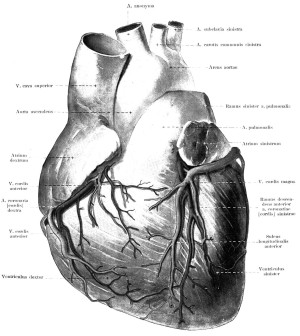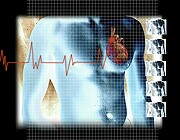- Could Your Grocery Store Meat Be Causing Recurring UTIs?
- Are You Making This Expensive Thermostat Error This Winter?
- Recognizing the Signs of Hypothyroidism
- 10 Strategies to Overcome Insomnia
- Could Artificial Sweeteners Be Aging the Brain Faster?
- Techniques for Soothing Your Nervous System
- Does the Water in Your House Smell Funny? Here’s Why
- Can a Daily Dose of Apple Cider Vinegar Actually Aid Weight Loss?
- 6 Health Beverages That Can Actually Spike Your Blood Sugar
- Treatment Options for Social Anxiety Disorder
CT Scans Might Spot Heart Risks More Clearly in Patients With Chest Pain


New research suggests that CT scans may help doctors do a better job of diagnosing heart disease in patients with chest pain, compared to standard tests.
A Scottish team found that CT scans seemed to spot more heart problems and allowed doctors to act to lower the risk of a heart attack.
“A CT scan clarifies the diagnosis, changes treatments and may reduce the risk of a heart attack,” said chief investigator Dr. David Newby, a professor at the University of Edinburgh.
The patients in question were suffering from chest pain and suspected heart disease. In most cases, the disease is caused by clogged arteries that disrupt the flow of blood in the body.
“The chest pain, or angina, is a tightness in the chest which comes on when they exert themselves,” Newby said. “Patients are usually seen in the clinic and can undergo a range of potential tests that could include a myocardial perfusion scan, which measures blood flow to the heart with a radioactive tracer, and ultrasound ‘echo’ scan, an MRI or a coronary angiogram.”
Dr. Gregg Fonarow, a professor of cardiology at the University of California, Los Angeles, said standard testing for patients can also include an electrocardiogram and a stress test. The problem: “This testing can at times potentially miss the presence of coronary artery disease, leading to an incorrect diagnosis,” he noted.
Indeed, Newby said, studies have shown that of those people who go on to have a heart attack, one-third had unrecognized disease when they were seen for testing.
Could a CT scan, a kind of X-ray that takes three-dimensional images of the heart, do a better job of detecting heart disease? To find out, the researchers examined the medical records of slightly more than 4,100 patients in Scotland who were treated for chest pain possibly due to coronary heart disease. The patients were randomly assigned to receive a CT scan or standard care after their initial visit.
CT scans changed the initial diagnosis in 25 percent of cases, while standard care resulted in different diagnoses in just 1 percent of patients. CT scans changed what tests were performed next in 15 percent of cases; tests changed in just 1 percent of those who got standard care. Meanwhile, CT tests led to changes in treatment in 23 percent of the cases, compared to 5 percent of patients who received standard care.
Over the next 20 months, the number of heart attacks was 38 percent lower in those who got CT scans: 26 cases versus 42 cases in those who received standard care. But the number of heart attacks didn’t reach statistical significance.
What about differences in cost between the two testing methods?
Another study presented this weekend at the ACC meeting addressed that question. Researchers led by Dr. Daniel Mark of Duke University’s Heart Center compared CT to functional testing in over 10,000 patients with chest pain.
They found that the average CT scan cost $404, an echocardiogram cost about $514, and a stress-test ECG was only $174. And because CT scans often pointed to the need for further procedures, its use added an additional average of $280 to medical bills incurred within the next three months. By two years later, however, the gap in cost had shrunk to just $30, the researchers found.
In an ACC news release, Mark said that “these differences in cost are not statistically significant and the surgeries may well have improved the survival of the people who received them.” His team’s study was funded by the U.S. National Institutes of Health.
“The CT scan did cause other tests and treatments to be canceled, but it increased the use of some treatments,” Fonarow said. “However, these were obviously needed.”
As for side effects and risk, Newby said radiation from CT scans is low, and few patients — fewer than 2 percent — had mild and brief side effects due to the scan.
More research is planned, including long-term studies. But Newby said he is ready to advise doctors to use CT scans “as your test of choice” in patients with chest pain who may have coronary artery disease.
Newby’s study is to be presented Sunday at the American College of Cardiology’s annual meeting in San Diego, and published simultaneously online March 15 in The Lancet.
More information
For more about CT scans, try the U.S. National Library of Medicine.
Source: HealthDay
Copyright © 2026 HealthDay. All rights reserved.










